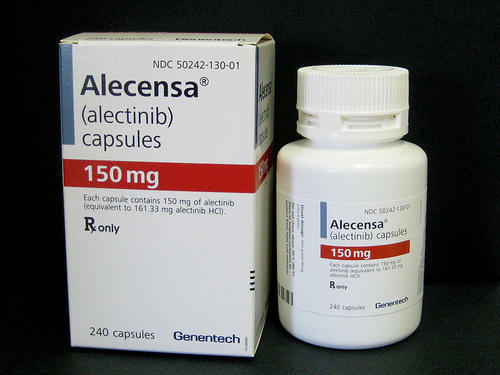What is Alecensa (alectinib)?
Alecensa (alectinib) is an oral therapeutic for advanced (metastatic) ALK-positive non-small cell lung cancer (NSCLC)1,13,14.
Who is Alecensa (alectinib) for?
Alecensa (alectinib) is indicated for the treatment of people with anaplastic lymphoma kinase (ALK)-positive, metastatic non-small cell lung cancer (NSCLC). It was initially approved as a new option for patients whose disease has worsened after crizotinib or who could not tolerate it in the first place2,10,12,13. (Crizotinib is a drug for ALK-positive NSCLC widely approved, e.g. in USA by the Food and Drug Administration (FDA)2 and in Europe by the European Medical Agency (EMA)3).
Recently the approval has been extended to include the treatment of patients whose disease has not been treated yet (first-line treatment)1,13,14,16.
How does Alecensa (alectinib) work?
Similarly to crizotinib, alectinib is an ALK-inhibitor, which acts by inhibiting the activity of the ALK protein, and may thus prevent ALK-positive NSCLC-cells from growing and spreading2. Crizotinib and alectinib target different mutations of the ALK-gene7; the latter might thus prove effective when the former starts failing. Alectinib’s inhibiting action was observed in ALK gene mutations resistant to crizotinib8. Furthermore, while crizotinib is blocked by the brain’s defensive barrier7,9, alectinib demonstrated its ability to penetrate the central nervous system (CNS, brain and spinal cord) and its shrinking effect on brain metastases7,8.
Approximately 40% of the ALK-positive NSCLC patients develop metastases in their CNS, as an initial site of progression7,8. The ALK (anaplastic lymphoma kinase) gene plays an important role in the development of the brain, and exerts its effects on specific neurons in the nervous system6. Mutations of the ALK gene can occur in several different types of cells, including lung cells, and can result in the development of a tumour2. ALK gene mutations occur in 3 to 7% of patients with NSCLC7.
Where has Alecensa (alectinib) been approved?
Alecensa (alectinib) was approved for ALK (anaplastic lymphoma kinase)-positive non-small cell lung cancer (NSCLC) by:
Pharmaceuticals and Medical Devices Agency (PMDA), Japan, July 201410— second-line after crizotinib
Food and Drug Administration (FDA), USA, December 11, 20152 — first-line treatment since November 201716
European Medical Agency (EMA), European Union, February 21, 201712 — first-line treatment since January 201817
Therapeutic Goods Administration (TGA), Australia, March 14, 201713— first-line treatment since January 2018.
Please note that this medicine may have also been approved in other regions than the ones we’ve listed. If you have a question about its approval in a specific country feel free to contact our support team.
How is Alecensa (alectinib) taken?
The standard dosage is1,13,14:
600 mg (4 150 mg capsules) orally twice daily.
Administer Alecensa (alectinib) with food.
Administer until disease progression or unacceptable toxicity.
Complete information about Alecensa (alectinib) dosage and administration can be found in the resources guide below1,13,14.
Note: Please consult your treating doctor for personalised dosing.
Are there any known adverse reactions or side effects of Alecensa (alectinib)?
Common adverse reactions
The most common side effects listed in the prescribing information include1,13,14:
fatigue (tiredness)
constipation
oedema (accumulation of fluids)
myalgia (muscle pain)
anemia (lack of red blood cells).
Serious adverse reactions
The serious adverse reactions listed in the prescribing information include1,13,14:
hepatotoxicity (drug-induced liver injury)
interstitial lung disease (ILD)/pneumonitis
renal impairment (kidney failure)
bradycardia (slow heart rate)
severe myalgia (muscle pain) and creatine phosphokinase (CPK) elevation (muscle tissue injury).
Use in specific population
Alecensa (alectinib) could cause fetal harm when administered to a pregnant woman. Alecensa (alectinib) should not be used during pregnancy and breastfeeding is not advised1,13,14.
For a comprehensive list of side effects and adverse reactions please refer to the official prescribing information1,13,14.







